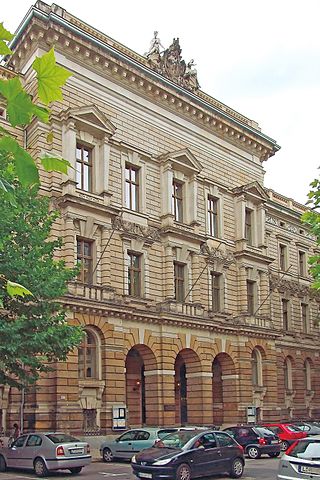Related Research Articles

The Hochschule für Musik Hanns Eisler Berlin in Berlin, Germany, is one of the leading universities of music in Europe. It was established in East Berlin in 1950 as the Deutsche Hochschule für Musik because the older Hochschule für Musik Berlin was in West Berlin. After the death of one of its first professors, composer Hanns Eisler, the school was renamed in his honor in 1964. After a renovation in 2005, the university is located in both Berlin's famed Gendarmenmarkt and the Neuer Marstall.

The University of Music and Theatre "Felix Mendelssohn Bartholdy" Leipzig (German: Hochschule für Musik und Theater "Felix Mendelssohn Bartholdy" Leipzig) is a public university in Leipzig (Saxony, Germany). Founded in 1843 by Felix Mendelssohn as the Conservatorium der Musik (Conservatory of Music), it is the oldest university school of music in Germany.
Johannes Wolfgang Zender was a German conductor and composer. He was the chief conductor of several opera houses, and his compositions, many of them vocal music, have been performed at international festivals.
Pascal Pons, born on 9 November 1968 in Nice, is a French percussionist.
Kai Wessel is a German countertenor and teacher at the Hochschule für Musik Köln.
Ludger Rémy was a German harpsichordist, conductor and musicologist.

Olaf Tzschoppe is a German percussionist and chamber musician.
Bernhard Haas is a German organist, music theorist and academic.
Janina Klassen is a German musicologist and professor at the Hochschule für Musik Freiburg.
Rolf Riehm is a German composer who wrote stage and orchestral works as well as music for ensembles and solo instruments. He began as an oboist and music teacher and was later a professor of music theory at the Hochschule für Musik und Darstellende Kunst Frankfurt am Main for several years.
Peter Ludwig Gülke is a German conductor and musicologist.
Hanns-Werner Heister is a German musicologist.
Emil Platen is a German musicologist and conductor.
Irmela Boßler is a German Western concert flautist.
Ludwig Holtmeier is a German music theorist and piano player.
Eckehard Kiem was a German music theorist, university professor and composer.
Hans Jürgen Wenzel was a German conductor and composer. He was chairman of the Verband der Komponisten und Musikwissenschaftler der DDR and professor for musical composition at the Hochschule für Musik Carl Maria von Weber Dresden.
Armin Suppan is an Austrian brass musician and composer.

Christian Dierstein is a German percussionist and academic teacher. He has performed internationally as a soloist and as a regular chamber music player with ensemble recherche and Trio Accanto, performing several world premieres. He has been a professor from 2001, with a focus on music beyond Europe and improvisation.
Lukas Florian David was an Austrian classical violinist.
References
- ↑ Abschiedskonzert Prof. Bernhard Wulff Archived 2017-11-07 at the Wayback Machine on Hochschule für Musik Freiburg
- ↑ Bernhard Wulff on Rate your music
- ↑ Viktor Ullmann, Sigmund Schul. on WorldCat
- ↑ Fremde Mongolei die Mongolin on WorldCat